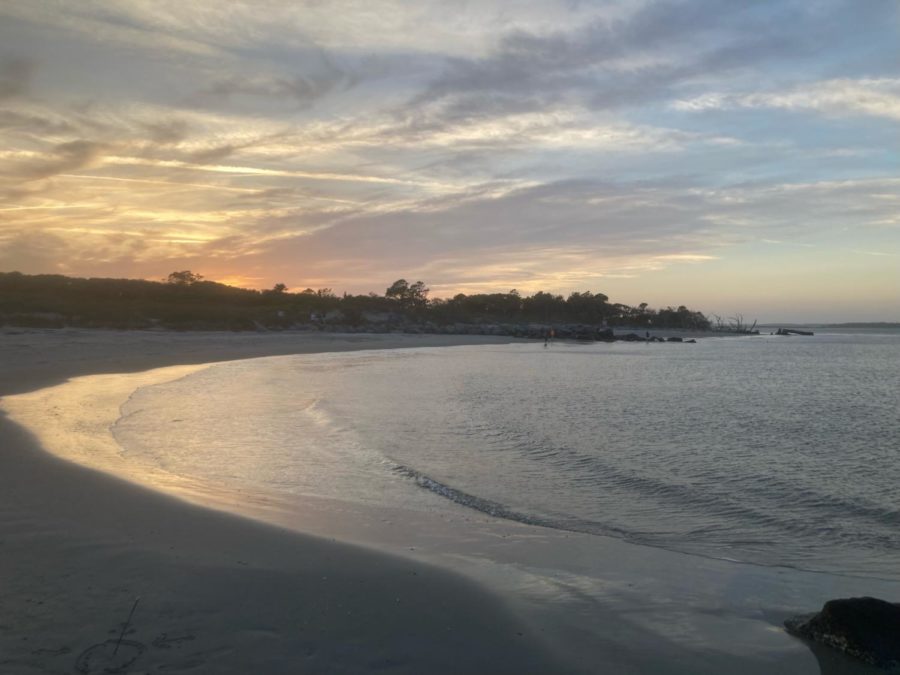Parents should condemn senior beach week, discourage illegal activities
Although beaches on the Outer Banks are more popular among seniors who go to beach week, other beaches on the east coast like Folly Beach in Charleston, SC can be a calmer alternative for graduates.
May 29, 2023
As most high school students finish their last week of finals, seniors prepare for beach week, a time meant to celebrate their graduation and allow them to spend time with one another prior to starting college. However, such an image contrasts greatly from a reality characterized by vandalized property, trashed homes and empty beer cans littering the shore.
Beach week is a period when high school graduates visit coastal beaches and oftentimes engage in smoking, sex, drug use and most prominently, binge-drinking. The detrimental customs of beach week have been a point of concern for families since the 1990s; however, they continue to exist today among teenagers.
According to a 1996 study from the Archives of Pediatrics and Adolescent Medicine, conducted on a sample of 59 female graduates, while 67% of the sample refrained from drug use and 55% from sex, abstinence from getting drunk was at only 12%. Although accusations of illegal activities and sexual assault during beach week were more common during the 1980s and 1990s, graduates from northern Virginia left a notorious mark on Currituck County beach towns in 2022, causing this year’s graduates to be discouraged from spending beach week there during the summer of 2023.
While it is important that students learn to accept the consequences of their actions, abstinence from illicit activities could help them avoid consequences themselves that would, in many cases, have substantially negative effects on their lives.
“I know some people who don’t want to get peer pressured into doing drugs or alcohol,” senior Sahil Lalani. “I am relieved that I don’t have to keep up resistance to that peer pressure, especially because I know that a lot of seniors last year were arrested for fake IDs, under-age drinking and drugs.”
Arrests and legal charges are not the only consequences that beach week goers who engage in illicit activities might regret. With the lack of clarity that results from excessive drinking, graduates are likely not fully aware of their actions. According to the Archives of Pediatrics and Adolescent Medicine, around 86% of the girls who reported having sex during beach week were drunk during the act.
Perhaps one of the biggest points of concern surrounding beach week has been lack of condemnation on the part of parents. Although many parents might simply not be aware of the misbehaviors taking place during the vacation period, it should be their responsibility to keep in contact with their children and frequently follow up on their actions to ensure that they are not only safe, but also away from the threat of arrests.
As explained by Susan Coll in her 2010 novel Beach Week, even when teens are accompanied by parent chaperones, parents sometimes fail to stay nearby students. As a result, they are not always present to break up parties or openly condemn drug use, drinking and vandalism of rented property. As chaperones, parents must make sure to stay close to students and discourage them from illegal activities.
Parents who are not chaperones should at the very least frequently check in with their children and make efforts to get to know other beach week goers and their families. This way, parents can help avoid endangering the future of their children and the family-friendly environments of host beaches. After all, while beach week is supposed to be fun for students, they shouldn’t risk throwing their lives right out of the gate just because of a short vacation.







Tony Cerri • Jun 8, 2023 at 8:35 am
Well said! I live in Corolla; one of the NC Outer Banks communities you describe. An example from this year – parents rented large homes in our 4WD area for large groups of teens and then rented homes for themselves elsewhere. They consciously and completely abrogated chaperone duties. Students were evicted the first night. One student then went and stayed with his parents in the alternate house. He was arrested for DUI the second night. Now has a record for life. Sad for the student. Exceptionally bad behavior modeling on behalf of the parents. Last year there were 118 arrests in one two day period in Corolla during beach week. That included both students and parents. Lots of damage done to many lives. Seems to be a thought that graduates and their parents are entitled to whatever behavior they desire during beach week. I appreciate you sharing with them that they are wrong. Thanks!